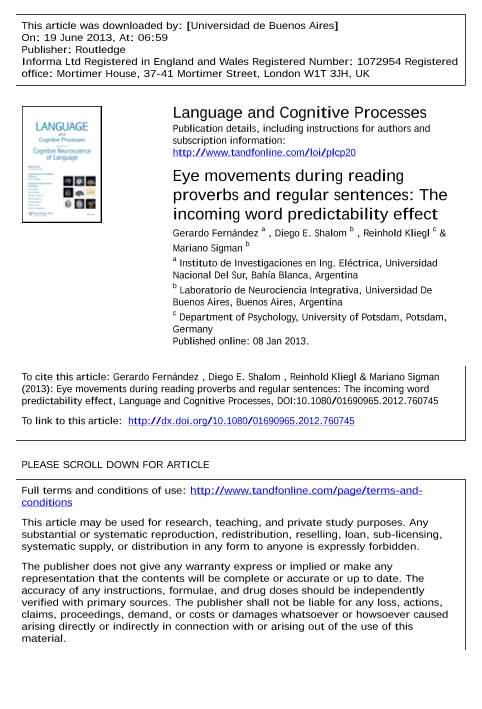Artículo
Eye movements during reading proverbs and regular sentences: the incoming word predictability effect
Fecha de publicación:
01/2013
Editorial:
Taylor & Francis
Revista:
Language and Cognitive Processes
ISSN:
0169-0965
Idioma:
Inglés
Tipo de recurso:
Artículo publicado
Clasificación temática:
Resumen
Reading is an everyday activity requiring the efficient integration of several central cognitive subsystems ranging from attention and oculomotor control to word identification and language comprehension. Effects of frequency, length and cloze predictability of words on reading times reliably indicate local processing difficulty of fixated words; also, a reader's expectation about an upcoming word apparently influences fixation duration even before the eyes reach this word. Moreover, this effect has been reported as non-canonical (i.e., longer fixation durations on word N when word N+1 is of high cloze predictability). However, this effect is difficult to observe because in natural sentences the fluctuations in predictability in content words are very small. To overcome this difficulty we investigated eye movements while reading proverbs as well as sentences constructed for high- and low-average cloze predictability. We also determined for each sentence a word at which predictability of words jumps from a low to high value. Fixation durations while reading proverbs and high-predictable sentences exhibited significant effects of the change in predictability along the sentence (when the successive word is more predictable than the fixated word). Results are in agreement with the proposal that cloze predictability of upcoming words exerts an influence on fixation durations via memory retrieval.
Palabras clave:
Eye Movements
,
Reading
,
Proverbs
,
Incoming Word Predictability Effect
Archivos asociados
Licencia
Identificadores
Colecciones
Articulos(IFIBA)
Articulos de INST.DE FISICA DE BUENOS AIRES
Articulos de INST.DE FISICA DE BUENOS AIRES
Citación
Fernández, Gerardo Abel; Shalóm, Diego Edgar; Kliegl, Reinhold; Sigman, Mariano; Eye movements during reading proverbs and regular sentences: the incoming word predictability effect; Taylor & Francis; Language and Cognitive Processes; 29; 3; 1-2013; 260-273
Compartir
Altmétricas




